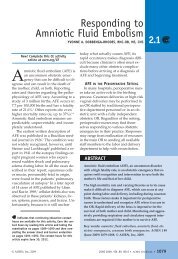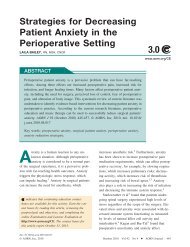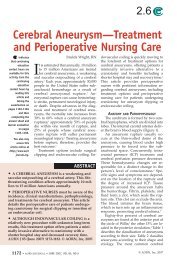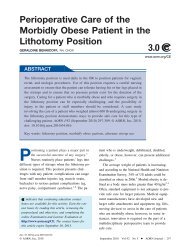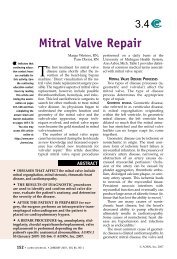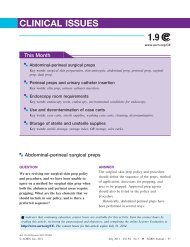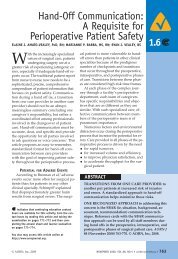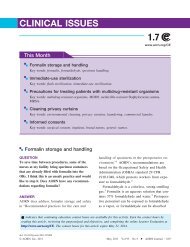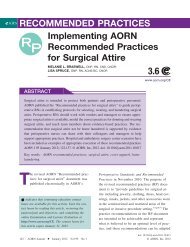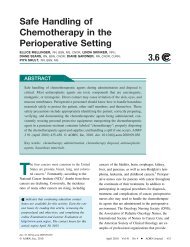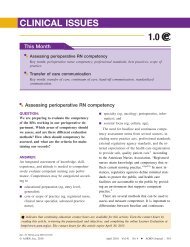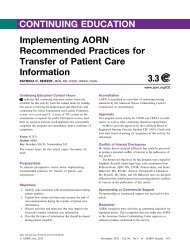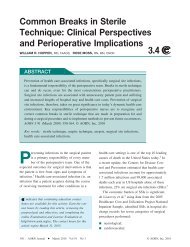MARCH 2009, VOL 89, NO 3HudekDocumenting the presence ofemergence delirium is important,and nursing care provided to manageit should be included in thepatient’s plan of care.by the medication or the fact that children premedicatedwith midazolam had a slower awakeningfrom anesthesia. 3 In another study, researchersfound that premedication with midazolamdid reduce the incidence of negativebehaviors postoperatively but did not necessarilyreduce the incidence of emergence delirium. 6Wells et al concluded from their observationsthat premedication with an anti-anxiety medicationdoes not prevent emergence delirium. 5 Allthese authors agree that there is a complex networkof factors that intermingle in trying to decipherthe cause of emergence delirium; therefore,trying to prevent emergence delirium isjust as multifaceted. 3,5,6It is important to provide a calm and reassuringenvironment with constant reality orientationfor patients experiencing emergencedelirium. Patients displaying paranoid ideationwill need continual guidance. 3-5 Patients whoslip into unconsciousness need to be reorientedeach time they regain consciousness. Controllingthe environment and providing adequateand proper stimulation for the patient isimportant. This may include having familymembers remain with the patient throughouthis or her PACU stay. 4Adequate and proper stimulation for the patientis individualized based on the patient’smaturational level and coping mechanisms. Fora child, having the parents present and playingsoothing music may be appropriate. 3 If the parentsare highly anxious or distraught at seeingtheir child in an agitated state, however, thechild may respond better without the parentspresent. In one incident of emergence delirium,an adult patient was convinced that his wifewas in grave danger. The nurse brought his wifeinto the PACU to assure him that she was allright. His wife stayed in the unit to reassure himthroughout his recovery. 1 Other patients may becomforted by a quiet environment with littledisturbance and calm, quiet care from staffmembers.DOCUMENTATION AND PATIENT TEACHING. Documentingthe presence of emergence delirium is important,and nursing care provided to manageit should be included in the patient’s plan ofcare (Table 1). The presence of emergence deliriumand how to care for the patient after dischargeshould be explained to family membersand caregivers. Family members or caregiversalso should be made aware that in older adultpatients, the presence of emergence deliriummay be a harbinger of postoperative delirium,which can appear hours, days, or weeks aftersurgery. 4 <strong>Emergence</strong> delirium also may be associatedwith maladaptive behavior in childrenmonths after surgery. 6 This behavior may be expressedas generalized anxiety, nighttime crying,enuresis, temper tantrums, and separationanxiety. Postoperative teaching is important tohelp caregivers be alert for the onset of postoperativedelirium and maladaptive behaviorsand provide support to the patient.DECREASING THE RISK OF EMERGENCE DELIRIUMThere is no identified way of preventingemergence delirium, but there are steps nursescan take that may decrease its incidence. Identifyingrisk factors for emergence delirium canaid in identifying patients who might experienceit and allow staff members and the patient’sfamily members or caregivers to manageit if it occurs. 2,4 Risk factors include• the patient’s age,• type of surgery,• type of anesthesia,• previous response to surgery,• pre-existing medical conditions, and• current medications.PREOPERATIVE ASSESSMENT. Administering a structuredpreoperative evaluation of the risk factorsfor emergence delirium, as well as the patient’sanxiety, can alert perioperative team members to512 • <strong>AORN</strong> JOURNAL
Hudek MARCH 2009, VOL 89, NO 3the possibility that emergence delirium mayoccur. 2 If the patient’s anxiety is high, the nursecan implement steps to reduce it. The nurseshould encourage any person unfamiliar withthe hospital environment, especially a child andhis or her family members, to visit the hospitalbefore surgery or ensure that admission personneltake additional time when the patient arrives,allowing him or her to become accustomedto the hospital environment. All clinicalinterventions taken to prepare the patient forsurgery should be explained in as much detailas the patient requires, and the nurse shouldallow the patient adequate time to ask questions.In the case of pediatric patients, the nurseshould take time to orient and reassure the parentsas well as the child. Parental anxiety mayrelate directly to a child’s anxiety level. 6 Studieshave shown that anxiety levels are lower in peoplewho have been able to familiarize themselveswith the hospital setting and any plannedprocedures. 4,6Preoperative patient teaching is an importantstep for reducing patient anxiety. Knowledgeof what will occur and what to expectafter surgery—especially in regard to catheters,surgical drains, and IVs—may lessen a patient’spostoperative distress. 2 Individual attentionto each patient is important. The nurseneeds to balance both the amount of detail andhow information is presented to each patientso that anxiety is lessened and not increased.Preoperative sedation to lessen anxiety isdiscussed in the literature as having varyingresults. Some studies demonstrate that premedicationwith midazolam or clonidine reducesthe incidence of emergence delirium,while other studies show the opposite effect. 2-4,6Patients taking antidepressants have a lowerincidence of emergence delirium than the generalpopulation, probably because of the medications’anxiety-reducing effects; however, administeringthese medications is not recommendedto prevent emergence delirium. 2,4INTRAOPERATIVE CARE. Attempts to reduce patientanxiety should continue into the intraoperativesetting. Perioperative staff membersshould work to provide a calm, reassuring environmentin the OR. Distracting noise or conversationsunrelated to patient care should beeliminated as much as possible, both duringinduction and emergence from anesthesia.During induction, the patient should be allowedto hold his or her anesthetic mask if desired.Children should be allowed to take transitionalobjects such as a favorite blanket orsmall toy with them to the OR, and a parent orcaregiver should accompany the child to the ORfor induction whenever possible.Fentanyl administered intraoperativelymay assist in reducing emergence delirium inchildren. 3 The type of inhalation anestheticsgiven to children 3 and the use of inhalationanesthetics versus propofol in adults 2 may increasethe incidence of emergence delirium. Inolder adults, a large blood loss during surgeryis associated with emergence delirium. 4 Theseissues should be communicated to the PACUreceiving nurse.POSTOPERATIVE CARE. Postoperatively, pain is amajor precipitating factor for emergence deliriumso it is important that the patient receive adequatepain control. 1,2,4 The nurse should be alertfor nonverbal signs of pain (eg, restlessness; facialgrimacing; holding or trying to support thearea causing pain; elevated blood pressure;rapid, weak, or bounding pulse; elevated respirations)and use a pain scale when applicable. 4Other factors that may influence emergencedelirium, such as bladder distension and hypoglycemia,will require initiative on the part ofthe nurse to assess and treat.Supplemental oxygen is important, but theirritation of a nasal cannula or the perceived“confinement” of an oxygen mask may exacerbatesymptoms of emergence delirium. 2 If thepatient appears bothered by the nasal cannula,the nurse can consider switching to a mask, orif the patient is bothered by the mask, the nursecan let the mask sit loosely just off of the patient’sface if his or her oxygen saturation remainsadequate.Reality orientation as the patient is comingout of anesthesia in a calm environment willprovide a smooth transition to wakefulness forthe majority of patients. Knowing that theirprimary care provider is with them in thePACU may lower children’s levels of anxietyand allow them to adjust more smoothly asthey emerge from anesthesia.<strong>AORN</strong> JOURNAL • 513



